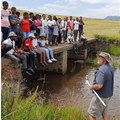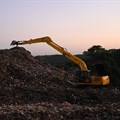World Wide Fund for Nature South Africa (WWF SA) and the Johannesburg-based African Reclaimers Organisation (ARO) have teamed up to work with Cape Town-based waste reclaimers to help them unite and organise.

The representatives from WWF, ARO, the City of Cape Town’s Solid Waste Minimisation and Cleansing unit and reclaimers stand outside the municipal offices in Pinelands, Cape Town after their first meeting. | Source: Supplied.
The one-year project, which is being coordinated by WWF, funded by 3M and implemented by ARO, aims to help Cape Town waste reclaimers self-organise. The aim is to reach as many informal reclaimers as possible to be part of the integration process.
In early December 2021, ARO held initial discussions with reclaimers from communities across Cape Town – including Khayelitsha, Makhaza, Gugulethu, Pinelands and Mitchells Plain – to inform them of the intervention and listen to their challenges.
ARO and WWF also held an introductory meeting with the City of Cape Town’s Solid Waste Minimisation and Cleansing unit and community reclaimer representatives. The municipality supports a few ongoing recycling initiatives and recently commissioned part of its informal waste sector integration mandate to GreenCape.
ARO also met with GreenCape to share the reclaimers’ vision during these initial engagements in Cape Town. In line with these activities, the City of Cape Town, through GreenCape, launched an integration task team in December 2021. The WWF-ARO project will provide input into the proceedings of this task team.
Project will unite Cape Town-based waste reclaimers
The 2020 Waste Picker Integration Guideline for South Africa stipulates that municipalities must support reclaimers with resources without influencing or taking away their independence.
According to WWF, the informal waste reclaimers “will be able to speak with one voice for proper integration into the city’s formal waste management system” if they come together. The organisation also believes hat an “organised structure will also provide a platform for them to negotiate fair compensation for their services and receive recognition by society for diverting household waste sent to already overburdened landfills”.
“Currently, the majority of waste collectors in Cape Town work individually with no access to sorting space, transportation, personal protective equipment (PPE) or pre-negotiated buy-back facilities that would fairly purchase their recyclable materials. Stockpiling these recyclable items in homes is a norm and it is a potential safety and health risk in their communities,” WWF said.
The informal reclaimers, it added, also experience price exploitation by middlemen, often with very little monetary compensation and at times, no payment for the materials at all. “The prices per kilogram for different materials in Cape Town are much lower than what the reclaimers in Johannesburg receive for selling their reclaimed recyclables,” the organisation said.
Through the process of organising into a recognised structure, WWF hopes that the waste pickers will also be able to provide input in sector-wide proceedings around Extended Producer Responsibility (EPR), separation at source and negotiations with other stakeholders on issues around infrastructure, logistics, service delivery and fees. “Further, they will have representatives who can liaise with authorities on their behalf when necessary,” it added.
WWF research officer and project coordinator Lethabo Pholoto commented: “We are delighted to collaborate with ARO on this project because of their extensive experience in this space and their ground-breaking pilot projects in Johannesburg.
“WWF aims to accelerate the transition towards a circular economy for plastics through meaningful collaboration with all stakeholders across the value chain. This intervention contributes to this mandate as we hold a vision of no plastic in nature."



















































